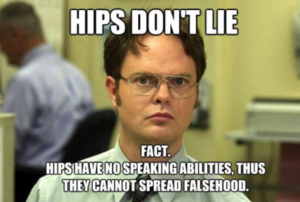If you or someone you know has knee pain then this article is for you.
Obviously as a Physical Therapist my first line of defense to help you recover from an injury is a natural method. I believe the body is an amazing machine capable of healing, given the right environment.
As a cyclist I have suffered with knee pain occasionally and have always been able to bounce back using natural methods. This is actually how I discovered how effective dry needling is for muscle and joint pain.
I was out with some friends doing a warm up ride for the upcoming Hotter Than Hell 100 mile bike ride in Wichita Falls. We were on the way back and headed up a small climb when I got a sharp, searing pain in my right knee and thigh muscle.
I was able to continue riding but at a much slower pace. Over the next one to two weeks I used massage, ultrasound, stretching and had my therapist work on the knee. It was 90% better but occasionally I still had some “sensations” that everything was not 100%.
I signed up for this new course that was teaching therapists how to use acupuncture needles to reduce pain and speed up the healing process. I went for education but received so much more.
On a break the instructor needled my right knee and thigh muscles. Although it was uncomfortable at the time and sore later that evening (like a really good workout), my knee felt amazing the next day.
But what happens if you try natural methods and your pain continues resulting in knee surgery. Or you have severely injured your knee and surgery is absolutely necessary?
Here I will provide some answers to the most common questions I have received over my 23+ years of experience talking to patients and helping them through their recovery.
The Number ONE question is how long is this going to take?
That is a “loaded” question but I will give you a range which depends on several factors.
What type of surgery did you have? How old are you and what type of health are you in?
If you are a healthy 20 something that had a knee scope to clean up a small meniscus tear then the recovery process could be 6-8 weeks.
Contrast to a 75 year old in poor general health who had a knee replacement, then we are talking closer to 12 months.
Quite a range!
#2 Is it going to hurt?
The short answer is yes, but the degree of pain varies.
I’ve had some patients come in after a knee replacement with very little pain (3/10) on a 0-10 scale and others at a 10/10 and everything in between.
Part of this depends on the extent of the surgery and the ability to control your pain with medications, ice packs and gentle exercise.
What I see most often is patients are in pain so they don’t move the joint like they should. This creates a nasty cycle where the joint becomes very stiff from not moving, which increases the pain, leading to less movement from the patient. This will continue.
This is where your physical therapist comes in. Our role is to coach you along the way to get the best outcome possible and to act as a sounding board for your questions.
Learn How To Stop Chronic, Daily Annoying Knee Pain WITHOUT Injections, Dangerous Painkillers and AVOID Surgery
Free Workshop Reveals The Single Biggest Secret To Avoiding Knee Surgery
Saturday April 10th 2021 at 10AM
Click To Register
#3 It seems like the exercises are making me worse! Why?
Again a very common question or statement. This is very similar to question #2. Most patients have been in pain for quite some time. This has forced them to limit their activity and impose limits on themselves.
Once they begin therapy after their surgery our goal is to get the joint moving. This can stimulate the pain receptors located throughout the joint.
The good news is that the more you do it and the more flexible the joint becomes, the pain lesses and your overall quality of life improves.
The graphic demonstrates our comfort zone and how over time we put ourselves into a smaller and smaller box by letting our limitations stop us.
#4 What can I do at home?
Your therapist will design a home exercise program specifically for you and the type of surgery you had.
As a general rule most patients will use ice packs for 3-7 days post-op then transition to a mild heating pad to gently warm the joint prior to exercise.
In addition to exercise and ice or heat, keeping the knee elevated above the level of your heart throughout the day helps with the swelling and pain.
#5 When can I drive?
Usually the surgeon will not release you to drive until you are off your pain medications. Typically 4-6 weeks.
From a therapy perspective we want you to have adequate strength and mobility in case you have to hit the brakes suddenly or move your knee quickly.
Obviously having surgery on your right knee vs. the left might delay your ability to drive.
Bonus Tip:
How do I sleep?
-Answer: with your eyes closed!!!
Seriously sleep is essential when you are trying to recover from any injury or surgery.
Shoot for 8+ hours during this process. You can also add in “naps” throughout the day.
Most patients want to sleep with a pillow under the knee as it is more comfortable, DON’T DO THIS.
The goal is to get your knee as straight as possible and sleeping or napping with a pillow under your knee will slow that process.
You can sleep on your side with a pillow between your knees or on your back with your legs elevated. These are the best two positions.
Hopefully you found these tips helpful whether you have had surgery or know someone who has had surgery and you shared this information.
So what do the most successful people do when they have knee pain? They address their problem.
I call it the 3 D’s Principle to handle any problem in life-Don’t Ignore it, Don’t Mask It, Do Something About It.
NEXT ACTION: If you are really serious about your knee health start by calling 817-220-6677 today to schedule your FREE NO OBLIGATION Discovery Visit.
At MOSS Rehabilitation Center we make it easy for you to get started. We even have a simple 3 step process.
1. Schedule a FREE NO Obligation, Discovery Visit with one of our experts. During this visit, you will talk with one of our friendly experts about your issues. This is a safe and confidential visit, you can trust that your safety and privacy is important to us. We are taking extra measures to ensure that you remain safe during this pandemic.
2. Receive a Customized (Individualized) Treatment Plan. Based on your free discovery visit, we will put together a custom, unique to you plan that will address all of your nagging pains and issues. The goal is to get you back to your healthy self as soon as possible while also addressing your issues for the long term.
3. Get Your Life Back and Do What You Love. The best result for us is a patient who tells us they can finally do what they love without the constant pain, stress, or issue they were facing. Together we can get you back to living life without worry.
Not only will we create a physical therapy program designed around you and your needs, but we also ensure to provide you with quality education for your long-term health.
The first step is always the hardest and I can’t take it for you but I promise we will do everything we can to help you.
Learn How To Stop Chronic, Daily Annoying Knee Pain WITHOUT Injections, Dangerous Painkillers and AVOID Surgery
Free Workshop Reveals the Single Biggest #1 Secret
To Avoiding Knee Surgery
Saturday April 10th 2021 at 10AM
PS. Not ready to make the call? If you are looking for guidance on your next step to finding relief from your knee pain then call our office to request my 100% FREE Report Top 5 Tips To Avoid Knee Surgery. Or if you want the report right now, please visit www.springtownphysicaltherapy.com/kneepain and you can download it instantly.
PPS. No one will ask for any money for anything when you call 817-220-6677 to request your free report which is perfect for those who are suffering with knee pain and want to avoid surgery.
The author, Dr. Robert Moss PT, ScD is the owner of MOSS Rehabilitation Center in Springtown, TX. He is happy to help you with your knee pain problems either by phone 817-220-MOSS (6677) or email robert@springtownphysicaltherapy.com.


